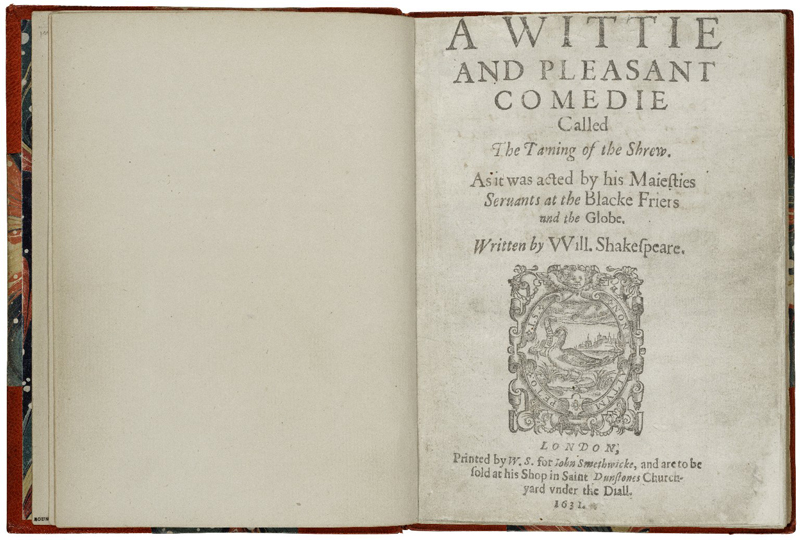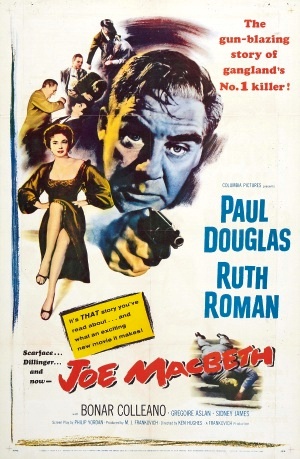 The Archives and Rare Books Library is proud to announce our partnership with the Cincinnati Museum Center. The Museum Center just announced their Shakespeare exhibit, which ARB is helping them prepare! Opening August 25th, the exhibit will be centered on Shakespeare’s First Folio (published 1623). The Folio is generously being lent to CMC by the Folger Shakespeare Library, which toured the work throughout the U.S. just last year. The exhibit will explore Shakespeare through time—how his works have adapted, what’s influenced new interpretations, and how appreciation of his work has evolved. There will be a focus on how Cincinnati has interacted with Shakespeare over time. Continue reading
The Archives and Rare Books Library is proud to announce our partnership with the Cincinnati Museum Center. The Museum Center just announced their Shakespeare exhibit, which ARB is helping them prepare! Opening August 25th, the exhibit will be centered on Shakespeare’s First Folio (published 1623). The Folio is generously being lent to CMC by the Folger Shakespeare Library, which toured the work throughout the U.S. just last year. The exhibit will explore Shakespeare through time—how his works have adapted, what’s influenced new interpretations, and how appreciation of his work has evolved. There will be a focus on how Cincinnati has interacted with Shakespeare over time. Continue reading
Tag Archives: Shakespeare
Inside a Costumer’s Mind: 12 Questions with Cincinnati Shakespeare Company’s Resident Costume Designer, Amanda McGee
By: Sydney Vollmer, ARB Intern
Almost one year ago, Jeremy Dubin, Artistic Associate with at the Cincinnati Shakespeare Company, was kind enough to answer some questions we at the ARB had about the company. After writing our last blog on the costume designs in King Lear, we decided we were curious about what goes on in the mind of a costume designer. So, we went back to the CSC. Resident Costume Designer, Amanda McGee, answered everything we wanted to know. Below is the full copy of the interview with images.

Amanda McGee
King Richard III: A Hunch about his Costume
Sydney Vollmer, Archives & Rare Books Library Intern
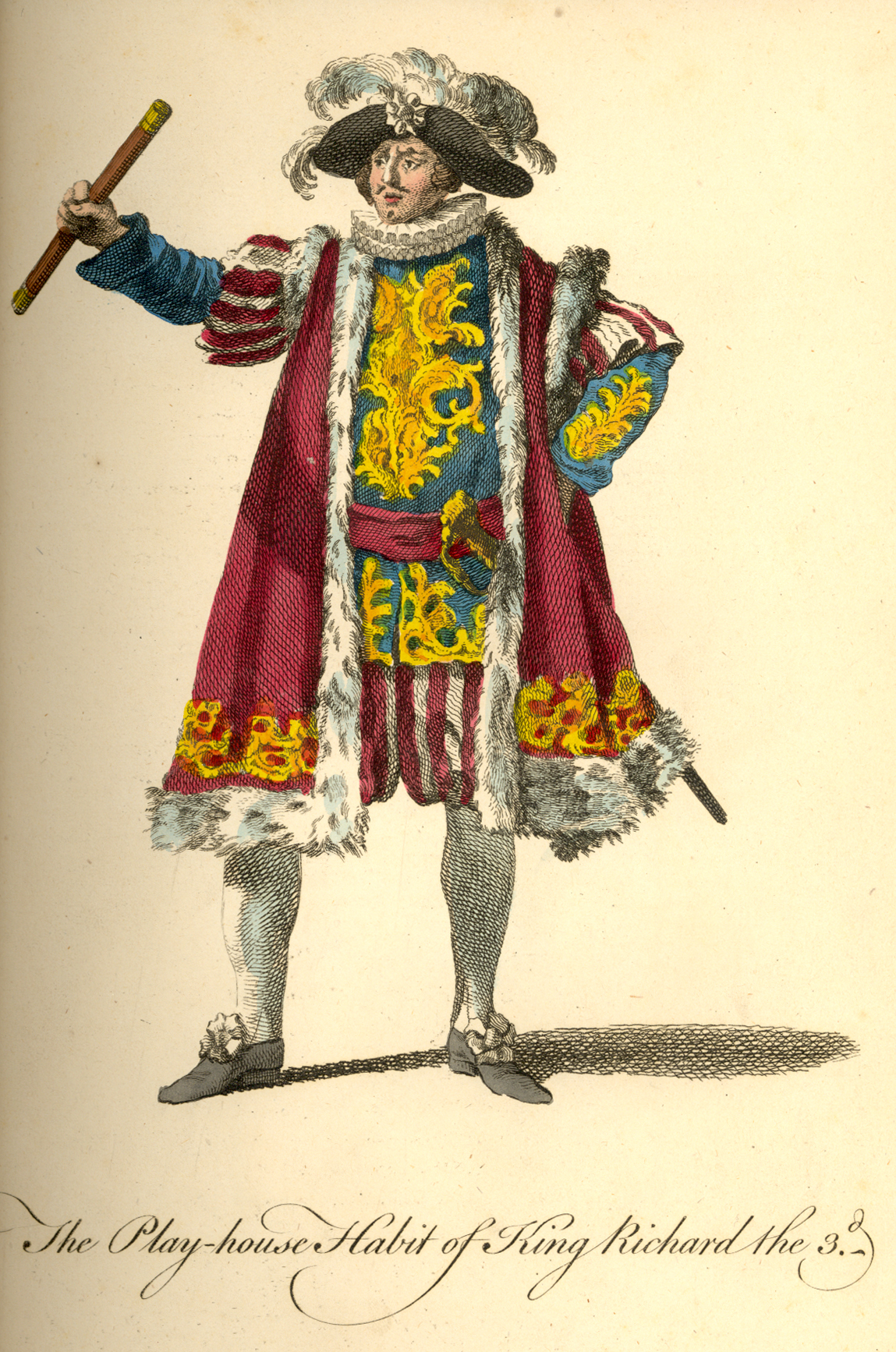 For those faithful followers who have not been keeping up with local theater, the Cincinnati Shakespeare Company’s next production will be Richard III, running February 17th through March 11th. Their website (http://www.cincyshakes.com/) says of the show:
For those faithful followers who have not been keeping up with local theater, the Cincinnati Shakespeare Company’s next production will be Richard III, running February 17th through March 11th. Their website (http://www.cincyshakes.com/) says of the show:
Shakespeare’s game of thrones enters its endgame as the history cycle’s final chapter takes the stage. The ruthless, remorseless and relentless Richard Plantagenet has his eyes set on the throne of England, and he makes the happy earth his hell as he carves a bloody swath through all that stands in his way. The History Cycle comes to its thrilling conclusion with the story of England’s most murderous monarch, Richard III. Paired with the production of Henry VI: The Wars of the Roses, Part 2, this theatrical event is not to be missed! Continue reading
Costuming a King
By: Sydney Vollmer, ARB Intern
Since the beginning of theater, costumes have played a crucial role to the understanding and enjoyment of the stories. Over time, they have developed both in design and technique. It was the Greeks who first invented costumes, using them to differentiate between characters of different class. They were often ornate, with patterns and masks. Romans continued the tradition of costuming, but no major changes were made for hundreds of years. By the time Shakespeare came about, costuming had evolved so that actors would don whatever their character would wear in real life. Continue reading
Julia Marlowe – A Cincinnati Girl Learns To Be Juliet
By: Sydney Vollmer
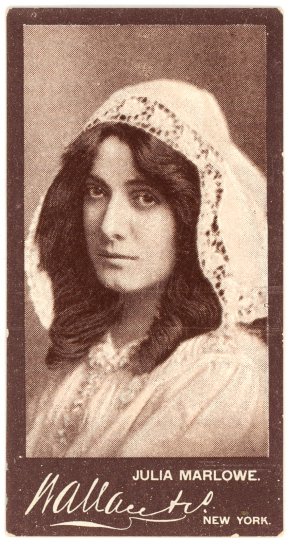 On August 17, 1866, Sarah Frances “Fanny” Frost was born in Caldbeck, England to John and Sarah Frost. As Julia Marlowe, she died at age 84 in New York City’s Plaza Hotel. Between those two events, she discovered passion, love (multiple times), and fame.
On August 17, 1866, Sarah Frances “Fanny” Frost was born in Caldbeck, England to John and Sarah Frost. As Julia Marlowe, she died at age 84 in New York City’s Plaza Hotel. Between those two events, she discovered passion, love (multiple times), and fame.
The future Shakespearean actress was born into a relatively normal family. She had four siblings, three sisters and a brother and her parents owned a general store while also working in the trades of needlework and boot making. Her father sometimes got drunk and her mother always got frustrated with him. At the age of 5, though, all of that “normalcy” changed for Marlowe. It was the year that her father whisked the family away to America. Plenty of people were immigrating to America during the 1870s, but Marlowe’s father did so to stay out of trouble. During an impromptu horse race between her father—where he was most likely drunk— and one of their neighbors, Mr. Frost allegedly took out his competitor’s eye with his whip. Knowing that he would surely face prosecution if he stayed, he immediately took his wife and children to America. Once arrived, they first settled in Kansas, but soon moved to Portsmouth, Ohio with the new surname “Brough,” which was the maiden name of Julia’s mother. Later on, the family would find out that the competitor had been playing a cruel joke and there had not been any reason to leave so urgently. Continue reading
The Taming of the Rude
By: Sydney Vollmer
You know by now that 2016 the year of the 400th anniversary of Shakespeare’s death and that the Archives & Rare Books Library is celebrating it in a big way by highlighting their Shakespeare holdings. BUT it’s also Women’s Week at the University of Cincinnati! Surprisingly, the two have something in common, but we’ll get to that. For the next few days, the topic of feminism will be spread  across Main Street all the way from TUC to the Rec Center. Women’s Week is a nice enough concept. I believe in strong females, and I certainly consider myself worthy of any opportunity a man is given. There’s always that stigma about feminism though…a stigma that being feminist means triumphing over men. And that’s where my problem lies both with feminism and with Women’s Week because last night, I saw a picture of a girl on Main Street holding a chalkboard that referred to boys as stupid. My definition of feminism has a lot more to do with mutual respect and a celebration of differences rather than drawing a line between the two sexes and saying one is better than the other.
across Main Street all the way from TUC to the Rec Center. Women’s Week is a nice enough concept. I believe in strong females, and I certainly consider myself worthy of any opportunity a man is given. There’s always that stigma about feminism though…a stigma that being feminist means triumphing over men. And that’s where my problem lies both with feminism and with Women’s Week because last night, I saw a picture of a girl on Main Street holding a chalkboard that referred to boys as stupid. My definition of feminism has a lot more to do with mutual respect and a celebration of differences rather than drawing a line between the two sexes and saying one is better than the other.
What Fools We Mortals Be
By: Sydney Vollmer
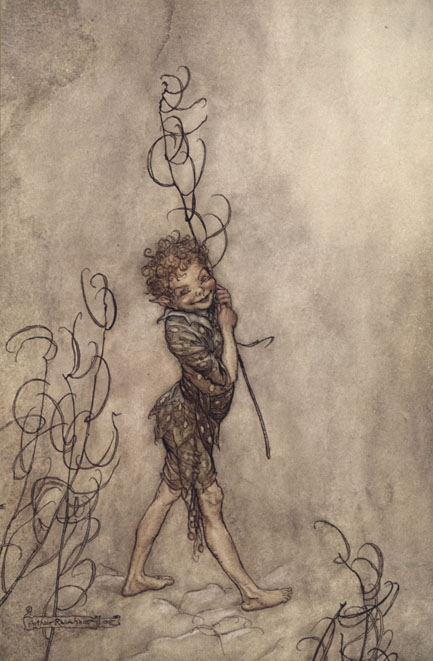 We all remember Puck from A Midsummer Night’s Dream. What a little imp. Well, actually, he isn’t quite an imp. He’s more of a hobgoblin. In fact, Puck is less a name than a species. Throughout mythology, “Puck” is interchangeable with “Robin Goodfellow.” The names come in different forms among various languages, but they all translate roughly to either “pixie” or “hobgoblin.”
We all remember Puck from A Midsummer Night’s Dream. What a little imp. Well, actually, he isn’t quite an imp. He’s more of a hobgoblin. In fact, Puck is less a name than a species. Throughout mythology, “Puck” is interchangeable with “Robin Goodfellow.” The names come in different forms among various languages, but they all translate roughly to either “pixie” or “hobgoblin.”
Throughout A Midsummer Night’s Dream, poor Puck is given orders to put spells on people he doesn’t recognize and things go awry. His willingness to perform, and then correct, shows his true obedience to King Oberon. However, if you aren’t King of the Fairies, a puck may not be as obedient. Pucks have a knack for being temperamental. It’s said that they’ve been known to do some minor household chores if they take a liking to you, but the helpfulness stops as soon as you offend them. Continue reading
Dealt a Similar Hand: An Analysis Between Macbeth and House of Cards
By: Sydney Vollmer, ARB Intern
With our political choices today, we wish we could pretend that what’s going on is some twisted, comedic version of House of Cards. Unfortunately for all of us, it’s completely real. There’s no use in dwelling on it, so let’s just pretend it doesn’t exist by diving back into House of Cards while we (patiently) await the fifth season.
I’m not a big HOC buff, but I saw the majority of episodes each time my dad monopolized the couch after every season’s release. The series magnifies brutality and corruption, somehow getting its audience to root for unlikeable characters. Truly, there is no one on the show that you can look at as the underdog, or the person who deserves their prize. When you think about it, the show is a complete extension of Shakespeare’s Macbeth, if his characters hadn’t died at the end. I’m certainly not the first person to make this comparison—not by a long stretch—but I did come up with this realization without external influences. That means that the comparisons are so strong that multiple people individually have stood up and said “Frank Underwood is the modern-day American Macbeth.” And there is plenty of evidence to back this up; I’ll show you what I mean. Continue reading
Joe Should Respect the Throne in Scotland, PA
By Sydney Vollmer, ARB Intern
Do you remember when I thought there were a lot of film adaptations of Hamlet? Well, it turns out that number is nothing compared to the number of films made on Macbeth. The adaptations started as early as 1916 and are still running strong. Over the past 100 years, more than 15 film adaptations have been created. That number doesn’t even include the amount of television shows based on the play, episodes with Macbeth as their title, or all of the times the play has been filmed for television. (See full list below.) Many of these films are direct adaptations, but a few are creative twists on the traditional story. These twists include: Joe MacBeth (1955), Throne of Blood (1957), Men of Respect (1990), and Scotland, PA (2001).
Joe MacBeth
1955
1h 30m
In this adaptation, we no longer are traipsing through dark castles in Scotland, but ducking through the alleyways as Lily MacBeth urges her husband to take down the top mob boss. Starring in this movie is Paul Douglas as “Joe MacBeth” and Ruth Roman as “Lily MacBeth.”
Greed Makes Ghosts in the Scottish Hills
By: Sydney Vollmer
 Actors have this weird superstition about the name “Macbeth.” I know you’re not supposed to say it inside a theater unless you’re actually rehearsing the play, but I wonder if there is an official rule on saying it outside before the show starts. My reason for asking is that this summer the Cincinnati Shakespeare Company has chosen to add Macbeth to their list of free Shakespeare in the Park performances along with A Midsummer Night’s Dream, and Romeo and Juliet. Continue reading
Actors have this weird superstition about the name “Macbeth.” I know you’re not supposed to say it inside a theater unless you’re actually rehearsing the play, but I wonder if there is an official rule on saying it outside before the show starts. My reason for asking is that this summer the Cincinnati Shakespeare Company has chosen to add Macbeth to their list of free Shakespeare in the Park performances along with A Midsummer Night’s Dream, and Romeo and Juliet. Continue reading

